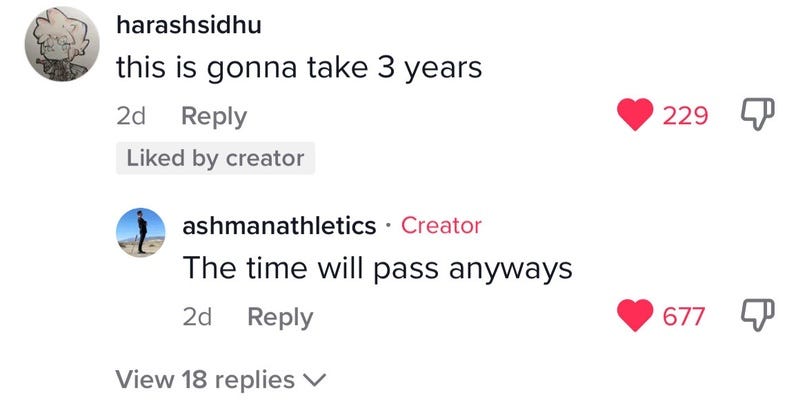“It takes five hundred shows to get a trick right, and more than a thousand to make it feel good.”
- David Copperfield
One consequence of spending too much time on the internet is that I have, at some point or the other, skimmed through the Wikipedia pages of most of my heroes. And once you read enough Wikipedia pages of the kinds of people who end up with Wikipedia pages written about them, a pattern starts to emerge. It’s that most people who are world class in their field were doing some version of that work really early in life. Not as in their early-twenties-early or even in their teen-years-early. But, like, before-the-age-of-ten-early. The craft that became their profession wasn’t even their “work” as much as it was the only way they wanted to spend their time.
Christopher Nolan was making homemade movies when he was seven. A.R. Rahman began studying piano at age four. Vladimir Kramnik already had an ELO rating of 2000 at age seven. Yadda yadda yadda. Go look up your favourite artist or athlete right now and you’ll find a similar story. These guys had been in the zone for decades; it just took a while for reality to catch up.
Once you see this pattern, you can’t unsee it. The more exceptional someone is at what they do, the earlier they seem to have started putting the work in. Of course, this is quite obvious stuff, but what surprises me about this is not the fact itself but the extent of this earlyness. Even with an ungodly amount of raw talent at any skill, it seems that it takes at least a few years of focused work to gid gud at said skill and at least a decade to hone into something great. Every expert seems to have their own version of Kanye’s “five beats a day for three summers”.
Here’s the thing, though: the older you get and the more people you meet, the more you realize that this pattern is everywhere. Anytime you see someone who’s even remotely good at anything - be it your colleague at work, the burrito guy who makes your lunch, or the podcaster who you listen to on the way home - know that they’ve been doing this for way longer than you’d have ever guessed. And if someone’s world class at the thing they do, like some of the rich and famous top 0.001 percentile folks I mentioned above, it’s likely that the thing they do is the only thing they’ve ever done their entire lives.
“Here’s what I know: if someone’s much better than you at something, they probably try much harder. You probably underestimate how much harder they try. I’m not saying that talent isn’t a meaningful differentiator, because it certainly is, but I think people generally underestimate how effort needs to be poured into talent in order to develop it.”
- Ava, Effort
Again, nothing mind blowing, I know, but the implications of this once you think about your own life can be uncomfortable. Because everyone has that one skill, hobby, sport, game, artform, or project that they want to “someday” dip their toes into but haven’t started on just yet. The timing ain’t right. But this is the dream project, the dream hobby. (“This was the no-brainer. This was the banker…”) I have one, you have one. And you know it’s gonna feel incredible once you’re good at that thing, once you really get it. It’s gonna finally make you whole. But there’s just one problem: as my Wikipedia snooping has showed me, even for the professionals it did take quite a while to get good at the thing they do. They just started unreasonably early in life. Which means that no matter what, you’re a long time away from seeing any tangible results out of your dream-thingy. And that’s assuming that you even try.
Okay, so let’s say you accept this fact. Let’s say you accept that for anything new you choose to pursue, you’re going to suck at it for a long time. It’s going to take weeks, months, years even, before you’re actually good at that thing. (And that’s assuming you stay consistent, which most people don’t (myself included)). And let’s say you know that the process of learning this skill, of getting incrementally better at your craft every day, is not going to be particularly quick or easy. Chances are that you’ll give up. Do you still go ahead?
If you really think about it, you only have two choices here:
a) either don’t pursue that skill or hobby at all, and thus avoid the growing pains of getting better at it, or
b) accept that you’re gonna suck at that hobby for a while and then do it anyway.
So then, the only question becomes: how badly do you want it?
Because if you’re venturing into something that’s entirely new to you, your only choices are to do it badly for a long time or not at all. And assuming this new hobby is something you genuinely, authentically want, the only question then becomes: what’s the earliest you can start, so you can pay that time-tax quickly? And the answer to that is, of course, at the earliest. Which is right now.
It sucks that skills take a long time to build. It sucks that it takes so much effort for us humans to become proficient at anything. But, assuming you’re genuinely interested in doing the thing for its own sake, paying this price still seems a vastly better option than the alternative of never once giving it a try. Because a few years from now you’re going to be that many years older anyway, so you might as well have something to show for it.




You too started quite early perhaps writing to yourself. Just stay consistent. Trust your skills.. You will reach there
This is so well written!